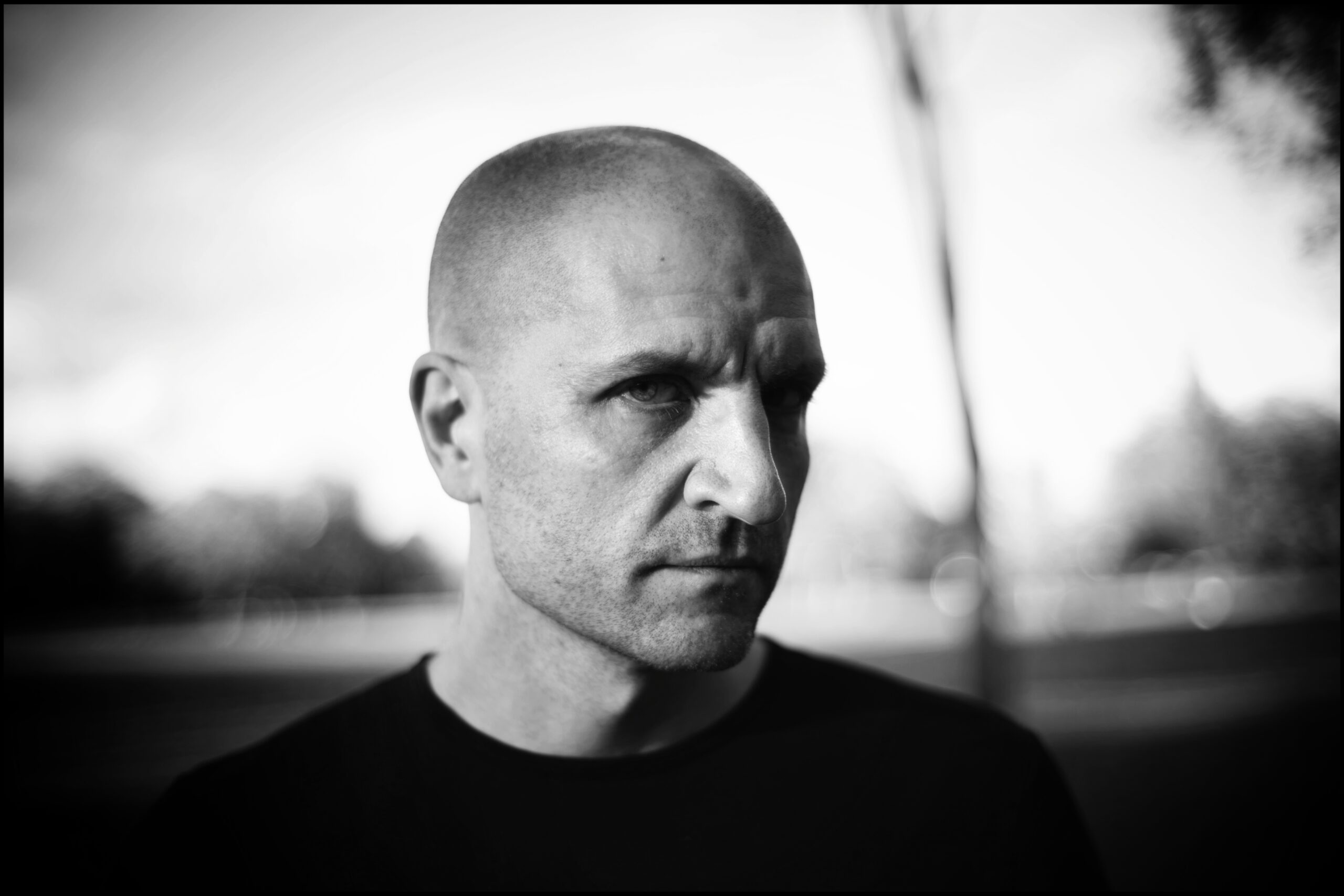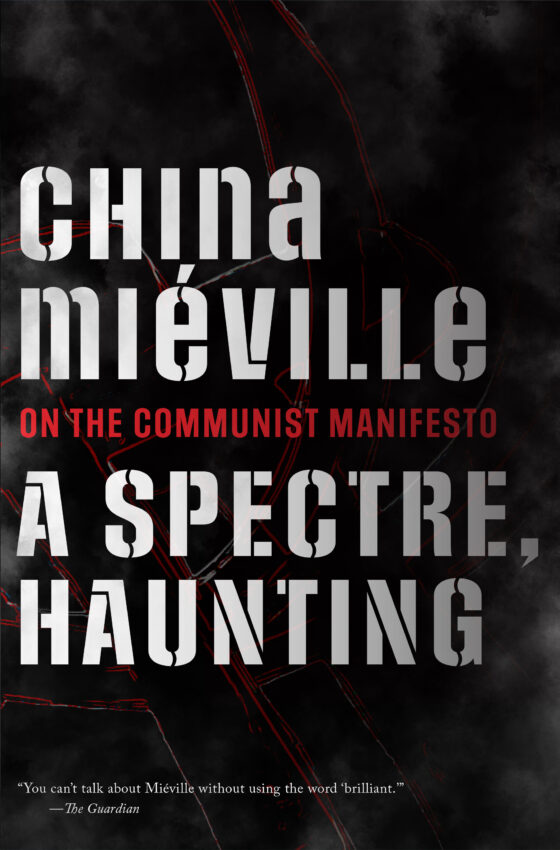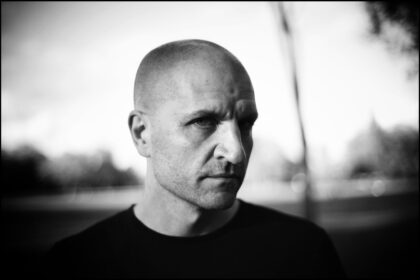 Author Photo Credit: © Barney Cokeliss
Author Photo Credit: © Barney Cokeliss
“[S]ome of the appeal of a radical movement can be, sometimes, for some people, precisely that it does seem to have an answer to most questions, in a world which disempowers in part through a sense of ignorance and shame therein…To suggest that a new humility is necessary for the Left is to insist that our texts are indispensable but not sacred… Another step is to admit, including to ourselves, that at times we’ve been very wrong. And will be again.”
-from A Spectre, Haunting: On The Communist Manifesto (2022) by China Miéville
I first encountered The Communist Manifesto as a college student and young single mother working three jobs to make ends meet. The Manifesto was never abstract to me; if anything, it gave me access to language I desperately needed to make sense of my life and position in what I still think of as the order of things in the world. I read it on the bus; in the bathroom; during stolen cigarette breaks. I read and re-read it alongside Sister Outsider: Essays and Speeches by Audre Lorde, Reflections on Exile by Edward Said, and The Wretched of the Earth by Frantz Fanon. I studied it as an immigrant, a postcolonial subject, and the eldest daughter of parents who lived through a US-supported genocide in Indonesia that destroyed what in 1965 were the third largest communist party and the largest women’s rights movement in the world. In Marx and Engels’ analysis and call to action, I experienced a feeling of communion that transcended my assigned identities in this specific place and time in history and found it reflected my deepest longings for a sense of agency, purpose, and belonging to the human project.
Twenty years later, I re-encountered this text through the eyes of China Miéville. It was at a moment when I could not escape the feeling of being bound and pressed down by the normalized powerlessness, alienation, and systemic cruelty that we have both inherited and learned to practice as a result of being alive under relentless imperialist, white supremacist, and capitalist rule. As a fan of science fiction and fantasy, I have at many points in my life sought refuge in Miéville’s fiction, which is distinguished by its ferocious imagination, indefatigable hope, and critical rigor, and which has also received the Arthur C. Clarke Award, the World Fantasy Award, the Hugo Award, and the British Science Fiction Award.
It was a unique gift to experience his nonfiction for the first time in A Spectre, Haunting: On The Communist Manifesto (Haymarket Books, 2022). In it, Miéville historicizes the production of the manifesto, contextualizes the aspirations of its authors, and reckons with the political projects the text has incited. More than that, he models for us a generous reading in the truest sense: to look a text in the eye and excavate its spirit so that it might illuminate our present situation.

Cynthia Dewi Oka (CDO): Can you share with us what compelled you to write A Spectre, Haunting: On The Communist Manifesto? What surprised or challenged you while working on this project?
China Miéville (CM): The project was originally suggested to me by my British editor based on having read something that I wrote about the Russian Revolution. Of course, the manifesto had been important to me, but I hadn’t read it for a very long time and a lot of water had passed under the bridge in terms of my own political, and spiritual, evolution.
The idea was to have someone write about the manifesto who didn’t pretend not to have an opinion about it, but was also not pretending to come at it as an expert already, but to research and learn through the writing. I’m a bit of gadfly, so I have a kind of shallow knowledge and interest in lots of things, which can be a real danger, but it can also be a strength in the sense that when you’re researching, it can allow you to have a certain kind of humility so that your own process of discovery can become part of the texture of the book itself.
There was also an urgency to the idea of approaching a text that is organized around and is a clarion for human freedom at a time when the forces militating against human freedom and, indeed, against planetary freedom, are stronger than at any other time in my living memory. Without pretending that everything was smooth before, I don’t think it’s entirely fallacious or historically self-aggrandizing to feel like we are in a particularly fucking nightmarish, tense, and disastrous moment.
CDO: Something I often think about is the relationship of the spectral to the nostalgic, and how that has become a very specific force mobilized by the Right, as a means of constantly reinvigorating a notion of some glorious past. The Left is susceptible to that as well regarding political movements that took place under radically different conditions than we have now – movements from the sixties through the eighties, for instance. I’m thinking about the limitations of deploying the specter as a kind of political guide in our current historical moment, which may be a double-edged sword?
CM: The sentimentalism of the Left is something that is quite strong and baleful, and I want to widen this kind of comradely and hopefully sort of generous caution into the aesthetic realms as well. I make my living writing fiction, and – I’m sure you’re aware of this as someone who works in the field of aesthetics – many of us on the Left are very eager to find political valence in pop culture. I don’t say this as someone who doesn’t like pop culture: I’m saying this in part as an auto-critique. But I think there can be great (sometimes unseemly) excitement about certain aesthetic ideas and inappropriate attempts to parlay them into political traction. Like, let’s look at this or that Marvel Universe movie and ask, “What are the lessons here for our politics?”
Aesthetic categories, including the weird and the spectral, have always been deeply polysemic. You can make ghosts do lots and lots of contradictory things, even, sometimes, at the same time. Deflecting activism through or into the cultural stuff we like seems, to me, like an expression of political weakness. If we were stronger as a movement, we wouldn’t give a shit about the politics of some Amazon Prime series, you know what I mean? So, I think, use whatever metaphors you want to live by that get you out of bed in the morning, but don’t forget that there is nothing about it that is intrinsically liberatory. Fascists can be just as interestingly spectral as we can be. I love the spectral in Marx, and I can talk about it for ages, but I’m very cautious of the idea that there is somehow a “lesson” in it.
CDO: A follow-up question to that, then. Is there a distinction for you between political interventions and cultural or artistic activities? For instance, in recent years we’ve seen the emergence of the term “artivism” to denote art practices that are intended to function as activism. I personally consider my artistic practice as quite distinct from my political practice, which is to say it has intentions, priorities, strategies, and impacts that are not collapsible to those of my art (and vice versa), even though my art is certainly informed by my politics.
CM: I mean, that’s a huge and very good question. First, we need to clear the ground by dispensing with the false dichotomy. No one here is saying that there’s no politics to art. No one is saying that there is a rigid boundary, or that you can’t apply political analysis to cultural or artistic works. I think that people who are taking opposition to the equivalence being made between art and activism have a much more serious, nuanced, and realistic relationship to the politics of art, because we understand that art is contradictory. That it does certain things and doesn’t do other things always reflects a complicated morass of extruded cultural norms that are pulling in contradictory directions.
I think the opposition to equating the two is really an opposition to artistic exceptionalism, which is the elitist proposition that by writing beautifully or putting paint on canvas, for instance, one is doing the same thing that other people do by striking. To me, it’s about having the humility to recognize that an artist is no more and no less historically special than a plumber or an Uber driver. That artistic practice is not more intrinsically intransigent or rebarbative to the dynamics of power and oppression all around us. The idea that artistic creations, no matter how wonderful they might be, are to some degree immune from the ravages of neoliberalism as expressions of one’s pure, radical soul, is just completely unconvincing to me.
This is not a criticism of how artists make a living. We all live under capitalism; we all have to make a living. But we also can’t guarantee there aren’t going to be loads of readers who are going to be getting very, very different things out of what I write, not least because it’s commodified. The form will naturally have an impact on the content. So, I want artists to have a realistic sense of ourselves as historical agents, you know? The baleful thing about capitalism is that it can not give a fuck about content as long as someone makes a profit. Write the greatest anti-fascist egalitarian poem, and if a corporation can make a buck off it, it will. Now one might inspire a bunch of readers, but equally, one is making money for a multinational corporation.
CDO: I often think about the inexplicable ways that specific texts or cultural artifacts have shaped parts of my overall selfness, and how that selfness ends up being the thing that is my actual material contribution to the movements. That is what I bring to the struggle at any given time – the sum of whatever cluster of stuff I am nourishing, or toxifying, myself with.
Let’s just use your fiction as an example. I read Perdido Station and The Scar at some of the lowest points in my life, right after I moved to the US when I felt very disoriented and isolated. The worlds in those books became imaginative spaces for me that sustained my sense of being part of the world, which allowed me to then seek out and move back into political practice. As you know, many political struggles tend to be quite localized and insular, with identity-based parameters, both because they are often necessary for articulation of a collectivity and because oppression forces people into defensive positions. I think that’s how art can sometimes do what movements sometimes fail to, which is to reach into the between-spaces, the interstices.
CM: Obviously, personally, that’s very moving for me to hear. But I do also think you’re describing the way art can function very beautifully, and I would want to find a middle way, because, on the one hand, I want to say that we don’t get to control how these things are received. And, on the other hand, I’m also not suggesting that there’s no political impact, or that it’s just kind of, throw the dice and let it land as it may. Certainly, there are certain texts which I think can tend towards certain readings and certain impacts. In a way that’s part of the process of creation, and indeed of creative reading.
One of the texts that I return to a lot that has had a huge impact on me is Eve Sedgwick’s “Paranoid Reading and Reparative Reading, or You’re So Paranoid You Probably Think This Essay Is About You.” One of the things about it is that she’s not criticizing one kind of reading over another. She says they’re both very necessary, but part of the idea is that you can find different resources in texts at different times. For example, in the 2000s it was quite a thing in London to put on “Boom Bye Bye” at queer parties and have people really shake their asses. That doesn’t make it any less of a violently homophobic song, but that also doesn’t mean that everyone dancing to it is lying or not enjoying themselves while playing with this thing. So, I think what I’m saying is that there can be real tendencies within the work, but there are also countless numbers of other mediating tendencies within the material reality of your experience of it. And that’s where sometimes our discussions about art can get too simplistic, because it’s not just about the work of art, the distinct experience of the artist and those who experience the work. It’s also about the commodity chain: how it’s sold, and who’s selling it.
CDO: I wonder if we can stretch our discussion around the spectral to another category, which is that of the spirit. I do think this word is important, as well as the distinctions between the personal and the political. I mean, Hegel, who theorized the zeitgeist as a real kind of moving force, had a huge influence on Marx. A unique experience for me in the Left is that I grew up in a very devout, fundamentalist Christian family. And that upbringing cultivated a certain habit that continues to shape my epistemological practices today. My relationship to reading, for instance, has been shaped by my experience with Bible study, where ordinary people engage and investigate with intensity that which exceeds definition. Once I was no longer in the church, I used that same habit in service of movement work, including in my own reading of The Communist Manifesto, which I think despite its antagonism toward religion, is animated by a profoundly spiritual force.
CM: You know, one of the things that I was very keen to do [in this book] was to take head on the accusation thrown around by critics of communism, that the manifesto is just some eschatological, millenarian, religious text. I think that it certainly is, and there is nothing wrong with that! Not only is religion a deeply noble tradition, it’s also a tradition that can express certain things. It can get, like nothing else can, to a certain kind of truth – that truth of the necessity of rupture, of exhaustion, the truth of yearning.
My mother was Catholic, but I wasn’t raised Catholic. I was raised with a judicious, courteous interest in religion, but from a politely atheist point of view. I mean, coming home to the philosophy of, and the sense of, the sublime, I think religion and religious writing would have been indispensably helpful for me. I can’t put it super clearly, but there is this certainty in me that the yearning that is inextricable from my political radicalism, that is inextricable from my hatred of capitalism, is also inextricable from the feeling I get – the hollow chest – when I look out over a beautiful forest, or watch an animal, or stare up at the stars. I’m hardly the first person to point out that there is a politics of the sublime. What’s interesting is that there’s a lot in theory and philosophy about how the sublime works, but a remarkably small amount that starts from saying how fucking weird it is that humans should feel this way at all. Why do we feel this way when we stand on the edge of a cliff? Why does watching a beautiful storm make you want to cry?
Allowing that those emotions, all emotions, are ideologically mediated, you still have two options. You either say that the feeling doesn’t fucking mean anything, or you can say that it is, in fact, important to the fact of humanness. And if our politics, let alone our radical, ruptural, liberatory politics, are about our sense of what being human is, then it really fucking matters. This is a very long-winded way of saying that I, like any reasonable number of people, am becoming increasingly fascinated with and drawn to religion and faith, what my friend and comrade Richard Seymour calls the re-enchantment of the world.
CDO: That makes me think about some of the radical political spaces I’ve encountered that reject the notion of the soul. They also seem to be rejecting many of the people that they purport to stand with. I grew up watching the moms and dads and uncles and aunties in my community, including my own parents, come to church to fall on their knees and weep, because that is the only place where they could do that. The only place where they have the permission to express the toll of the weight of the world. They could not go to a workers’ conference and do that. But that is what it means for many of us to be human every day. To feel like we have been brought to our knees, and burying that feeling at the same time.
CM: I had what, to me, was a very interesting debate with a couple of comrades after I wrote a piece for Salvage, the journal that I’m one of the editors of, that was drawing on the apophatic tradition of theology, which is concerned with the negative expression of God. Its focus is based on this premise that you can say what God is not much more easily than you can say what God is. It’s easy for instance, to say that there are two categories, the rational and the irrational, but I think there are three because there’s an enormous realm between them that Rudolf Otto, the writer of religion, calls the non-rational.
One of the things I was saying to these comrades in our debate, which is up online, is that they should consider that one of the great socialist slogans is “Bread and Roses.” What we want is bread and roses. It’s very clear from a rational point of view why we want bread, because if we don’t get it, we’re going to die. But why the fuck do we want roses? And that to me, in a nutshell, is the key, unanswerable question about socialism and spirituality. We have made it a platform that we want roses, and we are right to have done so.
What’s exciting for me is that this interest initially started with me finding a lot of powerful and interesting intellectual resources in theological writing, and has developed in recent years into a process of renegotiating my own relationship with the categories I’ve traditionally grown up with. It’s a process of radical uncertainty.
CDO: Yes, absolutely. Because it’s only in the face of profound uncertainty that faith becomes necessary. I feel like in my life, personal and political, the moments where I have felt or acted with the most conviction have been when the conviction is equal to the amount of doubt I have. In A Spectre, you draw attention to an official poster that the Soviet artist V. V. Spassky created for the new Communist International in 1919, in which he depicted The Communist Manifesto as a raft on which a lone worker tries to navigate a stormy sea. The worker is caught between a nearby sinking ship and a distant light, in equipoise between catastrophe and redemption. The worker clearly has a preference; no one wants to go back to the sinking ship that is capitalism, but in the image, the waves they face when they are directing themself towards the faraway light are higher than the waves between them and the ship. So maybe faith is the expression of the yearning you speak of. As in, the workers are expressing their yearning, without closing their eyes to the fate of the ship, the darkness and sea around them, their aloneness.
CM: Yes, the dark night of the soul! This is something we’ve written about in Salvage, and it’s something that Terry Eagleton has been quite good on, I think, but one of the things that the Left has really fucked up – I should say the Anglophone Left – is to conflate hope with optimism. They are not the same thing, and in fact, one of the things that has been most radicalizing for me in the last decade has been a break from political organization into a small group of comrades, where we’re not moralizing anymore about despair, where we are allowed to feel despair, and a sense of catastrophe, without the implication that this is in some way a betrayal of socialism. I think the moral injunction to always accentuate the positive in radical movements is a) a category error and b) cowardly. It is deeply, politically demotivating for a lot of people, because it creates shame. It’s politics by shame! I’m always reminded of the John Berger quote about the necessity of undefeated despair. And so, for me there is no paradox in the fact that, as my sense of political despair has grown stronger, so has my yearning for, my commitment to, and my activism for, a better world.
CDO: There’s something reckless, perhaps even a bit sadistic, about asking folks to turn on themselves and turn against our own bodies.
CM: Yeah, and to me, the worst is optimism. Joy is a real thing, a material force, and it erupts sometimes in the strangest moments. And hope is a stance towards the world that is, in a sense, a faith position in the best possible way. But optimism is a chosen disposition, irrespective of the facts. And that can be fucking stupid. It is an abdication of analysis. Of course, you may be optimistic in certain situations, where you’ve earned it by analyzing the situation and saying, ‘in this situation I think there is reason for optimism.’ But if you are chastised for not being optimistic enough, optimism becomes an a priori demand, and that is genuinely idiotic and disciplinarian. It’s exhausting and it’s authoritarian. It’s a species of what Lauren Berlant calls cruel optimism. It is demanding an optimism that is killing you.
When we started Salvage in 2015, our stance, broadly, was, “We are despairing, and yet we are undefeated. We think this is a desolate time, and we are seeking a way to be ruptural communists in a time of defeat and in a time of failure.” And one of the things that was extremely moving to us was the amount of correspondence we got from people who expressed relief and comradeship, and said, “I haven’t been active for years: I just felt like I was letting everyone down because I couldn’t believe the stories I was being told about how we were doing really well.” I don’t want to sound glib about this. I’m not saying, “Okay, we proved ourselves because we brought 20 people around the world back into activism.” What I am saying is, there’s no question that people can be pushed out and punished by that kind of obligatory optimism. And I’m very glad that the Left is getting a little better about this.
But I increasingly feel like a category that is more central to historical materialism than I have understood for years, is exhaustion. I want to see a whole book about this. I kind of feel like exhaustion is one of the key categories for radicalism, and when you read peasant utopias of the seventeenth century, or you hear folk songs like, “Big Rock Candy Mountain,” you realize that there is this constant refrain through history, this deep, desperate desire for rest. I think that just being allowed to rest is something that is deeply politically motivating for me, because capitalism will not let you rest. It will not let you rest, and there are so many ways in which we replicate that. It almost feels like the pandemic was a moment that kind of forced a stop. People got a sense of what it felt like when you don’t accept that you’re a machine. And I don’t think it’s a coincidence that many people, with various degrees of embarrassment and sheepishness, will confess to missing aspects of lockdown.
I miss the empty skies. I miss the quiet. And one of the things I think a lot of people miss is that sense that you can take a fucking breath. And it’s not just about work. Because of the commodification of everything, leisure is not much less exhausting than work. A lot of people I know just felt relief at not having FOMO. It should be acknowledged that this is not flat terrain. This kind of exhaustion impacts people differently, not least because of racialization and gendering, but it is also a generalized constitutive condition.
CDO: I feel like there’s something here that is percolating for me about rupture, exhaustion, and excess. Specifically, in the book you critique an excess of admiration for the bourgeoisie that Marx and Engels articulated in The Communist Manifesto. And I wonder how you think that has shaped our reception of it, our readings of it, our experiences of the text, our experiences of rupture? And perhaps one of the reasons we continue to lose sight of, and/or tolerate, this exhaustion?
CM: It’s one of the things that is most commented on: especially when people first read the manifesto there’s often this great surprise at how full of praise Marx and Engels are for the bourgeoisie. They absolutely eulogize their productivity, and their ability to kind of shape the world, and so on and so forth. And in my book, I try to get into that.
I think I think it is fair to say that there are certain wings of the Socialist movement which in, varyingly sophisticated ways, sort of inherited a certain kind of productivism that you still saw under the Bolsheviks, that you saw in Lenin, and so on, and this notion that the ability to Prometheanly produce loads of stuff is the measure of human achievement. And that capitalism, for all its flaws, did that better than feudalism, and therefore it was historically “progressive.” Now I want to be careful here because what tends to happen is that we’ll be back to these false dichotomies. People will sort of say, oh, you want to have a kind of simple monastic communism. I say, no, not at all. I like loads of stuff. I want lots of like stupid little toys and things. But here’s the key thing. I don’t presume to know what a liberated humanity, including a liberated me, is going to want under fully developed communism, because that’s where rupture comes in.
And I think the thing for me about the scale of rupture is that if you take it seriously, and this to go back a bit relates to our question about, faith and religion and eschatology, and the ‘kingdom of God on Earth’, if you like, that kind of millennial Messianic moment. If you take the scale of rupture seriously, if you imagine a humanity that is allowed to rest and then make its own decisions about the way it progresses, what kind of fucking arrogance would it be to suggest that we have the first idea about what liberated people would want?
We are constituted by this fucking shit, and the only way we get to not be constituted by it, is to be the people who are changing it, and who are there as it changes. Even then, I think you’re not really going to get liberated people until all the people who do the revolution fucking die, and their children grow up. One of the things that keeps me a communist is the sheer – to talk about the sublime – the sheer scale of the transformation that we want. We’re not just talking about getting rid of the profit motive; we are talking, to quote Engels, about an entirely “new human material,” a liberated people. And we can feel the glimmers of that now. Or we wouldn’t be Socialists. So, this isn’t to say we’re going to be aliens. It’s to say humanity deserves to be liberated, partly because some part of it knows that it isn’t, and it wants to be.





















